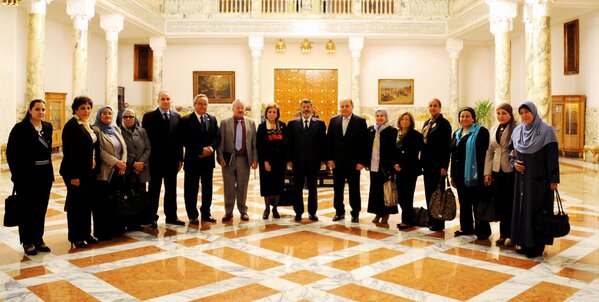By Rania Al Malky
CAIRO: In hindsight, it seems the grisly Nagaa Hammadi shooting of worshippers outside an Upper Egypt church on the eve of Coptic Christmas set the tone for the rest of the months that followed.
Egypt 2010 started with a bang, but as we have become accustomed, ended with a whimper.
The Qena criminal court has yet to pass a verdict in one of the worst sectarian killings in Egypt’s recent history, but clearly many Christians have. The ramifications of this crime have been stupendous and in many ways have informed the general mood of Egyptians this year, with clashes between Coptic demonstrators and police reaching a head near a church-affiliated building in Omraneya only days before heated parliamentary elections in November.
Egypt’s increasingly disgruntled Christians, like the majority of Egyptians whether Muslim or Christian, have become more vocal about violations of their civil, political, and social rights. With a damning US report condemning religious discrimination in the country, the regime has come under increasing pressure to shape up, but the reaction has been belligerent with the usual official warnings against over-stepping Egypt’s sovereignty.
Many loose ends left over from 2009 have remained open-ended this year, overshadowed by farcical People’s Assembly elections that gave birth to a comedic single-party parliament interspersed with a token presence of a handful of opposition figures and a few independent MPs, just to keep up appearances. The elections, participating in them or boycotting them, were the subject of talk shows, newspaper articles and lengthy manifestoes either extolling the beauty of our democratic process, or condemning the complete lack of it.
Naturally no one was surprised at the sweeping victory of the ruling National Democratic Party. All the surprises were the reserve of opposition parties, whose internal differences have already doomed Egypt’s first “alternative parliament” – a self-administered consolation prize for some very well-meaning politicians who have sadly not realized until now that change will not come through them. “Only god knows” what will happen next, to repeat President Hosni Mubarak’s famous words.
But I beg to differ. There are a few things we do know. We know that as long as we don’t have a law regulating the building of houses of worship, Egypt’s Christians will continue to suffer and complain of discrimination; that if corruption is not stamped out through the application of sweeping measures to ensure transparency and accountability, then Egypt will never move forward; that if political reform does not go hand in hand with the much-appreciated economic reform, we will be relegated to the dustbin of history because our most brilliant human resources will simply leave.
Another thing we do know is that we do not have a vice president. So far all the signs have indicated that the head of the Policies Secretariat at the NDP, Gamal Mubarak, is very likely to take over after his father as President in the unlikely event that Mubarak senior chooses to step down last minute before the 2011 presidential “race” – an event that will without a doubt stay in the family.
We also know that former IAEA Chief Mohamed ElBaradei is no longer an option, not that he ever was, in light of article 76 of the constitution which has stamped out any hope that presidential elections can ever be free and fair.
As I look back at 2010 and look forward to 2011, I see very little hope that anything will change drastically. Only divine intervention can upset the preconceived scenarios for the political future of this country.
But there is one ray of hope. Our social future is not doomed. Despite all the challenges we face no matter what our religious or political leanings are, we have many channels to discuss our differences and reach reconciliation. It’s no coincidence that Mark Zuckerman, the creator of Facebook, was chosen as Time magazine’s person of the year. The power of social networking is no longer restricted to solidifying existing friendships, but is a sure path to learning about our social, religious and cultural other. Political movements have started on Facebook and have brought together people who would never have know each other in the real world.
Let’s hope that 2011 will surprise us. You never know.
Rania Al Malky is the Chief Editor of Daily News Egypt.

